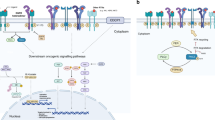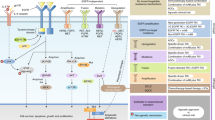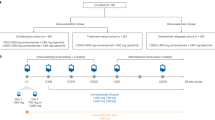Abstract
Tyrosine kinase inhibitors directed against the epidermal growth factor receptor (EGFR) are the first molecular-targeted agents to be approved in the US and other countries for the treatment of advanced non-small-cell lung cancer after failure of chemotherapy. Some patient characteristics, such as never-smoking, female gender, East Asian origin, adenocarcinoma histology, and bronchioloalveolar subtype, are associated with a greater benefit from treatment with EGFR inhibitors. Recently, studies have identified gene mutations targeting the kinase domain of the EGFR that are related to the response to inhibitors. Most EGFR mutations predict a higher benefit from treatment compared with wild-type receptors and are correlated with clinical features related to better outcome; some EGFR mutations, however, confer drug resistance. The analysis of material usually available from lung cancer patients, using techniques such as direct sequencing to determine EGFR mutational status, can be technically challenging. In this regard, high EGFR copy number and EGFR protein detected by immunohistochemistry can also be used to select those patients who would benefit from treatment. Prospective validation of biological and clinical markers of sensitivity needs to be performed.
This is a preview of subscription content, access via your institution
Access options
Subscribe to this journal
Receive 12 print issues and online access
$209.00 per year
only $17.42 per issue
Buy this article
- Purchase on Springer Link
- Instant access to full article PDF
Prices may be subject to local taxes which are calculated during checkout
Similar content being viewed by others
References
Parkin DM et al. (2005) Global cancer statistics, 2002. CA Cancer J Clin 55: 74–108
Dubey S et al. (2005) Three emerging new drugs for NSCLC: pemetrexed, bortezomib, and cetuximab. Oncologist 10: 282–291
Herbst RS et al. (2005) Angiogenesis and lung cancer: prognostic and therapeutic implications. J Clin Oncol 23: 3243–3256
Giaccone G (2005) Epidermal growth factor receptor inhibitors in the treatment of non-small-cell lung cancer. J Clin Oncol 23: 3235–3242
Paez JG et al. (2004) EGFR mutations in lung cancer: correlation with clinical response to gefitinib therapy. Science 304: 1497–1500
Lynch TJ et al. (2004) Activating mutations in the epidermal growth factor receptor underlying responsiveness of non-small-cell lung cancer to gefitinib. N Engl J Med 350: 2129–2139
Pao W et al. (2004) EGF receptor gene mutations are common in lung cancers from “never smokers” and are associated with sensitivity of tumors to gefitinib and erlotinib. Proc Natl Acad Sci U S A 101: 13306–13311
Sordella R et al. (2004) Gefitinib-sensitizing EGFR mutations in lung cancer activate anti-apoptotic pathways. Science 305: 1163–1167
Tracy S et al. (2004) Gefitinib induces apoptosis in the EGFRL858R non-small-cell lung cancer cell line H3255. Cancer Res 64: 7241–7244
Fabian MA et al. (2005) A small molecule-kinase interaction map for clinical kinase inhibitors. Nat Biotechnol 23: 329–336
Settleman J (2004) Inhibition of mutant EGF receptors by gefitinib: targeting an achilles' heel of lung cancer. Cell Cycle 3: 1496–1497
Janne PA et al. (2005) Epidermal growth factor receptor mutations in non-small-cell lung cancer: implications for treatment and tumor biology. J Clin Oncol 23: 3227–3234
Shepherd FA et al. (2005) Erlotinib in previously treated non-small-cell lung cancer. N Engl J Med 353: 123–132
Janmaat ML et al. (2003) Response to epidermal growth factor receptor inhibitors in non-small cell lung cancer cells: limited antiproliferative effects and absence of apoptosis associated with persistent activity of extracellular signal-regulated kinase or Akt kinase pathways. Clin Cancer Res 9: 2316–2326
Janmaat M et al. Enhanced cytotoxicity induced by gefitinib and specific inhibitors of the Ras or PI3K pathways in non-small cell lung cancer cells. Int J Cancer [10.1002/ijc.21290]
Fukuoka M et al. (2003) Multi-institutional randomized phase II trial of gefitinib for previously treated patients with advanced non-small-cell lung cancer. J Clin Oncol 21: 2237–2246
Kris MG et al. (2003) Efficacy of gefitinib, an inhibitor of the epidermal growth factor receptor tyrosine kinase, in symptomatic patients with non-small cell lung cancer: a randomized trial. JAMA 290: 2149–2158
Chou TY et al. (2005) Mutation in the tyrosine kinase domain of epidermal growth factor receptor is a predictive and prognostic factor for gefitinib treatment in patients with non-small cell lung cancer. Clin Cancer Res 11: 3750–3757
Mitsudomi T et al. (2005) Mutations of the epidermal growth factor receptor gene predict prolonged survival after gefitinib treatment in patients with non-small-cell lung cancer with postoperative recurrence. J Clin Oncol 23: 2513–2520
Pao W and Miller VA (2005) Epidermal growth factor receptor mutations, small-molecule kinase inhibitors, and non-small-cell lung cancer: current knowledge and future directions. J Clin Oncol 23: 2556–2568
Marchetti A et al. (2005) EGFR mutations in non-small-cell lung cancer: analysis of a large series of cases and development of a rapid and sensitive method for diagnostic screening with potential implications on pharmacologic treatment. J Clin Oncol 23: 857–865
Donohoe E (2005) Denaturing high-performance liquid chromatography using the WAVE DNA fragment analysis system. Methods Mol Med 108: 173–187
Takano T et al. (2005) Epidermal growth factor receptor gene mutations and increased copy numbers predict gefitinib sensitivity in patients with recurrent non-small-cell lung cancer. J Clin Oncol [10.1200/JCO.2005.01.0793]
Dressler LG et al. (2005) Comparison of HER2 status by fluorescence in situ hybridization and immunohistochemistry to predict benefit from dose escalation of adjuvant doxorubicin-based therapy in node-positive breast cancer patients. J Clin Oncol 23: 4287–4297
Cappuzzo F et al. (2003) Gefitinib in pretreated non-small-cell lung cancer (NSCLC): analysis of efficacy and correlation with HER2 and epidermal growth factor receptor expression in locally advanced or metastatic NSCLC. J Clin Oncol 21: 2658–2663
Parra HS et al. (2004) Analysis of epidermal growth factor receptor expression as a predictive factor for response to gefitinib ('Iressa', ZD1839) in non-small-cell lung cancer. Br J Cancer 91: 208–212
Perez-Soler R et al. (2004) Determinants of tumor response and survival with erlotinib in patients with non-small-cell lung cancer. J Clin Oncol 22: 3238–3247
Cappuzzo F et al. (2005) Epidermal growth factor receptor gene and protein and gefitinib sensitivity in non-small-cell lung cancer. J Natl Cancer Inst 97: 643–655
Tsao MS et al. (2005) Erlotinib in lung cancer—molecular and clinical predictors of outcome. N Engl J Med 353: 133–144
Hirsch FR et al. (2005) Increased epidermal growth factor receptor gene copy number detected by fluorescence in situ hybridization associates with increased sensitivity to gefitinib in patients with bronchioloalveolar carcinoma subtypes: a Southwest Oncology Group Study. J Clin Oncol [10.1200/JCO.2005.01.2823]
Amann J et al. (2005) Aberrant epidermal growth factor receptor signaling and enhanced sensitivity to EGFR inhibitors in lung cancer. Cancer Res 65: 226–235
Stephens P et al. (2004) Lung cancer: intragenic ERBB2 kinase mutations in tumours. Nature 431: 525–526
Shigematsu H et al. (2005) Somatic mutations of the HER2 kinase domain in lung adenocarcinomas. Cancer Res 65: 1642–1646
Kosaka T et al. (2004) Mutations of the epidermal growth factor receptor gene in lung cancer: biological and clinical implications. Cancer Res 64: 8919–8923
Pao W et al. (2005) KRAS mutations and primary resistance of lung adenocarcinomas to gefitinib or erlotinib. PLoS Med 2: e17
Soung YH et al. (2005) Mutational analysis of EGFR and K-RAS genes in lung adenocarcinomas. Virchows Arch 446: 483–488
Shigematsu H et al. (2005) Clinical and biological features associated with epidermal growth factor receptor gene mutations in lung cancers. J Natl Cancer Inst 97: 339–346
Rodenhuis S et al. (1988) Incidence and possible clinical significance of K-ras oncogene activation in adenocarcinoma of the human lung. Cancer Res 48: 5738–5741
Herbst RS et al. (2004) TRIBUTE—A phase III trial of erlotinib HCl (OSI-774) combined with carboplatin and paclitaxel (CP) chemotherapy in advanced non-small cell lung cancer (NSCLC) [abstract]. J Clin Oncol 22 (Suppl 14): S619
Eberhard DA et al. (2005) Mutations in the epidermal growth factor receptor and in KRAS are predictive and prognostic indicators in patients with non-small-cell lung cancer treated with chemotherapy alone and in combination with erlotinib. J Clin Oncol [10.1200/JCO.2005.02.857]
Cappuzzo F et al. (2004) Akt phosphorylation and gefitinib efficacy in patients with advanced non-small-cell lung cancer. J Natl Cancer Inst 96: 1133–1141
Pao W et al. (2005) Acquired resistance of lung adenocarcinomas to gefitinib or erlotinib is associated with a second mutation in the EGFR kinase domain. PLoS Med 2: e73
Kobayashi S et al. (2005) EGFR mutation and resistance of non-small-cell lung cancer to gefitinib. N Engl J Med 352: 786–792
Toyooka S et al. (2005) EGFR mutation and response of lung cancer to gefitinib. N Engl J Med 352: 2136
Shih J -Y et al. (2005) EGFR mutation conferring primary resistance to gefitinib in non-small-cell lung cancer. N Engl J Med 353: 207–208
Chen LL et al. (2004) A missense mutation in KIT kinase domain 1 correlates with imatinib resistance in gastrointestinal stromal tumors. Cancer Res 64: 5913–5919
Azam M et al. (2003) Mechanisms of autoinhibition and STI-571/imatinib resistance revealed by mutagenesis of BCR-ABL. Cell 112: 831–843
Carter TA et al. (2005) Inhibition of drug-resistant mutants of ABL, KIT, and EGF receptor kinases. Proc Natl Acad Sci U S A 102: 11011–11016
Han SW et al. (2005) Predictive and prognostic impact of epidermal growth factor receptor mutation in non-small-cell lung cancer patients treated with gefitinib. J Clin Oncol 23: 2493–2501
Lilenbaum R et al. (2005) A phase II trial of cetuximab as therapy for recurrent non-small cell lung cancer [abstract]. J Clin Oncol 23: S629
Tsuchihashi Z et al.: (2005) Responsiveness to cetuximab without mutations in EGFR. N Engl J Med 353: 208–209
Raez LE et al. (2005) Clinical responses to gefinitib after failure of treatment with cetuximab in advanced non-small-cell lung cancer. J Clin Oncol 23: 4244–4245
Huang SF et al. (2004) High frequency of epidermal growth factor receptor mutations with complex patterns in non-small cell lung cancers related to gefitinib responsiveness in Taiwan. Clin Cancer Res 10: 8195–8203
Kim KS et al. (2005) Predictors of the response to gefitinib in refractory non-small cell lung cancer. Clin Cancer Res 11: 2244–2251
Tokumo M et al. (2005) The relationship between epidermal growth factor receptor mutations and clinicopathologic features in non-small cell lung cancers. Clin Cancer Res 11: 1167–1173
Mu XL et al. (2005) Gefitinib-sensitive mutations of the epidermal growth factor receptor tyrosine kinase domain in chinese patients with non-small cell lung cancer. Clin Cancer Res 11: 4289–4294
Cortes-Funes H et al. (2005) Epidermal growth factor receptor activating mutations in Spanish gefitinib-treated non-small-cell lung cancer patients. Ann Oncol 16: 1081–1086
Author information
Authors and Affiliations
Corresponding author
Ethics declarations
Competing interests
The authors declare no competing financial interests.
Rights and permissions
About this article
Cite this article
Giaccone, G., Rodriguez, J. EGFR inhibitors: what have we learned from the treatment of lung cancer?. Nat Rev Clin Oncol 2, 554–561 (2005). https://doi.org/10.1038/ncponc0341
Received:
Accepted:
Issue Date:
DOI: https://doi.org/10.1038/ncponc0341
This article is cited by
-
Application of clinical bioinformatics in lung cancer-specific biomarkers
Cancer and Metastasis Reviews (2015)
-
Molecular imaging for detection of sensitivity and resistance to EGFR tyrosine kinase inhibitors in non-small cell lung cancer
Clinical and Translational Imaging (2014)
-
EGFR mutations in malignant pleural effusions from lung cancer
Current Respiratory Care Reports (2013)
-
Phase I study of continuous afatinib (BIBW 2992) in patients with advanced non-small cell lung cancer after prior chemotherapy/erlotinib/gefitinib (LUX-Lung 4)
Cancer Chemotherapy and Pharmacology (2012)
-
Recent Advances on the Molecular Mechanisms Involved in the Drug Resistance of Cancer Cells and Novel Targeting Therapies
Clinical Pharmacology & Therapeutics (2008)



